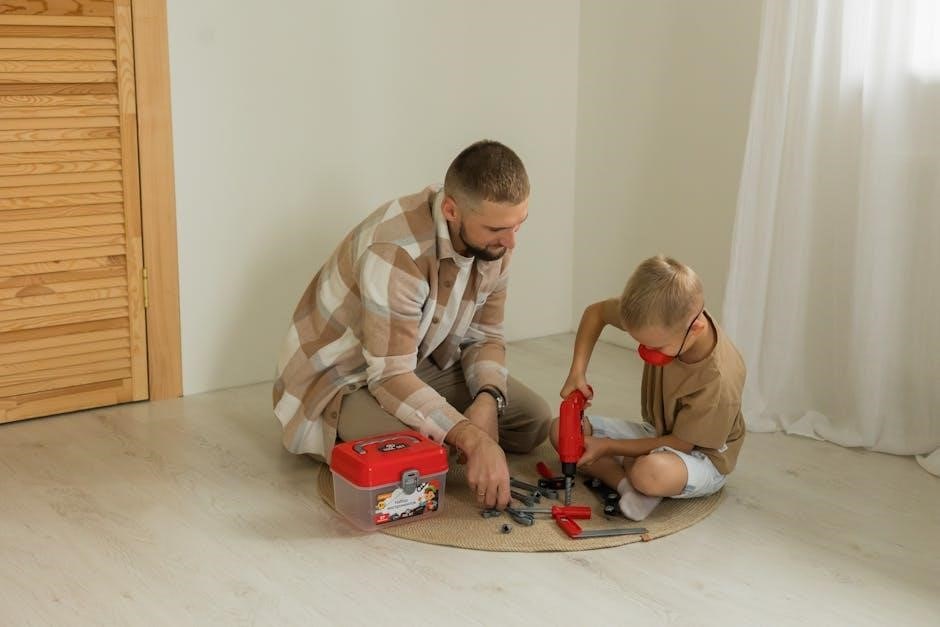
burnt parents guide
Understanding Parental Burnout: A Comprehensive Guide
Parental burnout, a growing concern, signifies profound exhaustion, detachment from children, and a diminished sense of parental effectiveness; it’s a chronic stress-related syndrome impacting families․

What is Parental Burnout?
Parental burnout represents a chronic, stress-related syndrome distinct from typical parental stress․ It’s characterized by profound emotional exhaustion, a growing sense of distance from one’s children, and a diminished feeling of being a capable parent․ Unlike temporary fatigue, this exhaustion persists regardless of rest, impacting daily functioning․
This isn’t simply feeling tired; it’s a deeper depletion of emotional resources․ Parents experiencing burnout may feel overwhelmed by the demands of parenting, struggling to find joy in their role․ It manifests as a sense of contrast from their former selves, a loss of identity beyond parenthood․
Importantly, parental burnout isn’t a sign of weakness or inadequacy․ It’s a consequence of sustained, overwhelming demands coupled with insufficient support, potentially leading to serious consequences for both parents and children․
The Prevalence of Parental Burnout Today (as of 11/26/2025)
As of today, November 26th, 2025, parental burnout is increasingly recognized as a significant issue affecting a growing number of families․ While historically overlooked in favor of discussions surrounding professional burnout, awareness is rapidly expanding․ Reports indicate a substantial rise in cases, suggesting it’s no longer a rare occurrence but a widespread phenomenon․
Current data suggests that a significant portion of parents are experiencing symptoms consistent with parental burnout, though precise figures remain challenging to ascertain due to underdiagnosis․ The UK reports burnout affecting a fifth of employees, hinting at broader societal stress levels contributing to parental strain․
Experts observe that the pressures of modern parenting, combined with societal expectations, contribute to this rising prevalence, making proactive identification and support crucial for parental and child well-being;

Recognizing the Symptoms
Parental burnout manifests through extreme exhaustion, emotional distance from children, and a feeling of being overwhelmed; recognizing these signs is the first step towards recovery;
Physical Symptoms of Parental Burnout

Physical exhaustion is a hallmark of parental burnout, extending beyond typical tiredness; it’s a persistent, draining fatigue that doesn’t improve with rest, leaving parents feeling constantly depleted and running on empty․ This can manifest as chronic headaches, muscle tension, and digestive issues, often stemming from prolonged stress and lack of self-care․
Sleep disturbances are also common, with parents experiencing difficulty falling asleep, staying asleep, or waking up feeling unrefreshed, despite adequate hours in bed․ Some may notice changes in appetite – either a loss of interest in food or turning to comfort eating as a coping mechanism․
Furthermore, a weakened immune system can lead to increased susceptibility to illness, with parents frequently catching colds or other infections․ These physical symptoms aren’t merely signs of being tired; they represent the body’s response to chronic, unmanaged stress, signaling a critical need for intervention and self-prioritization․
Emotional and Mental Symptoms
Emotional distance from children is a core feature, characterized by a feeling of detachment and reduced emotional responsiveness – parents may find themselves less engaged in their children’s lives and struggles to feel joy in parenting․ This often accompanies a pervasive sense of overwhelm, feeling constantly stressed and unable to cope with daily demands․
Increased irritability and frustration are also common, with parents reacting more strongly to minor annoyances and experiencing a shorter fuse․ Feelings of hopelessness, helplessness, and a diminished sense of self-worth can emerge, contributing to a negative self-perception․
Mental burnout and brain fog – difficulty concentrating, remembering things, and making decisions – are frequently reported, impacting cognitive functioning and overall well-being․ These symptoms highlight the profound mental toll of chronic parental stress, potentially leading to more serious mental health consequences if left unaddressed․
Behavioral Signs: Distance and Irritability
Observable behavioral changes often manifest as emotional distancing from children, where parents may withdraw, becoming less involved in activities and showing reduced affection․ This isn’t necessarily intentional, but a protective mechanism against further emotional exhaustion․ Increased irritability is another key sign, presenting as a shorter temper and heightened reactions to everyday parenting challenges․
Parents experiencing burnout might exhibit a lack of patience, snapping at children over minor issues, or struggling to maintain a calm demeanor․ A diminished capacity for empathy can also emerge, making it difficult to understand or respond to a child’s emotional needs․
Furthermore, a general sense of apathy and withdrawal from social interactions, even with close friends and family, can be observed, reflecting the overwhelming fatigue and emotional depletion associated with parental burnout․ These behaviors signal a desperate need for support and self-care․
Identifying the Root Causes
Core causes include chronic stress from overwhelming demands, a significant lack of social support leading to isolation, and the pervasive pressure of unrealistic expectations and perfectionism․
Chronic Stress and Overwhelming Demands
Parental burnout frequently stems from the relentless, ongoing stress inherent in modern parenting․ The sheer volume of demands – financial pressures, household responsibilities, childcare, and managing work-life balance – can quickly become overwhelming․ This isn’t simply about being busy; it’s about a sustained state of high alert and emotional strain․
These demands often feel inescapable, leaving parents feeling constantly depleted and unable to recharge; The expectation to be “always on” – readily available to meet a child’s needs, manage schedules, and navigate unexpected challenges – contributes significantly to this chronic stress․ Furthermore, societal pressures and the constant comparison to other parents can exacerbate feelings of inadequacy and increase the burden․
This persistent strain doesn’t allow for adequate recovery, leading to a gradual erosion of emotional and physical resources, ultimately culminating in the exhaustion characteristic of parental burnout․ It’s a cycle where demands continually outweigh available coping mechanisms․
Lack of Social Support and Isolation
A significant contributor to parental burnout is the absence of robust social support networks․ Modern family structures often lack the close proximity of extended family, leaving parents feeling isolated in their challenges․ This isolation intensifies the burden of parenting, as there’s limited opportunity to share responsibilities, seek advice, or simply vent frustrations․
The feeling of being alone in navigating the complexities of parenthood can be profoundly demoralizing․ Without a supportive community, parents may struggle to access practical help – childcare, emotional encouragement, or even just a listening ear․ This lack of connection can lead to feelings of loneliness and inadequacy, further exacerbating stress levels․

Furthermore, societal expectations can discourage parents from openly admitting their struggles, reinforcing the sense of isolation․ Building and maintaining a strong support network is therefore crucial in preventing and mitigating parental burnout․
Unrealistic Expectations and Perfectionism
Parental burnout is frequently fueled by the relentless pursuit of unrealistic standards․ Many parents internalize societal pressures to be “perfect” – flawlessly balancing work, childcare, household duties, and personal well-being․ This pursuit of perfection is inherently unsustainable and sets parents up for disappointment and exhaustion․
Social media often exacerbates these unrealistic expectations, presenting curated images of seemingly effortless parenting․ Comparing oneself to these idealized portrayals can lead to feelings of inadequacy and self-doubt․ The belief that one should be able to “do it all” creates immense pressure and prevents parents from accepting help or prioritizing self-care․
Letting go of perfectionism and embracing imperfection is vital․ Recognizing that good enough is enough, and that seeking support is a sign of strength, not weakness, are crucial steps towards preventing burnout․

The Impact of Parental Burnout
Parental burnout significantly impacts parent-child relationships, potentially leading to emotional distance, child neglect, and severe mental health consequences for exhausted, overwhelmed parents․
Effects on Parent-Child Relationship
Parental burnout profoundly alters the dynamic between parents and their children, often manifesting as emotional distance and a reduced capacity for empathy․ Exhausted parents may struggle to provide the consistent, nurturing care children require, leading to feelings of insecurity and abandonment in the child․ This detachment isn’t intentional, but a consequence of depleted emotional resources․
The quality of interactions diminishes; playful engagement decreases, replaced by irritability or withdrawal․ Parents experiencing burnout may find themselves reacting to their children with frustration rather than patience, creating a cycle of negative interactions․ This can erode the child’s trust and sense of security, impacting their emotional development and attachment style․ A diminished sense of parental efficacy further exacerbates the issue, as parents feel less confident in their ability to positively influence their child’s well-being, creating a self-fulfilling prophecy of strained connection․
Potential for Child Neglect
Parental burnout, when severe and unaddressed, can unfortunately increase the risk of child neglect, though it’s crucial to emphasize this isn’t intentional malice․ Exhaustion and emotional depletion impair a parent’s ability to consistently meet a child’s basic needs – physical, emotional, and developmental․ This neglect isn’t necessarily dramatic abandonment, but can manifest as consistent inattention, inadequate supervision, or failure to provide emotional support․
Research links parental burnout directly to increased instances of neglectful behaviors․ A parent overwhelmed by their own struggles may struggle to ensure a child’s hygiene, nutrition, or safety․ Emotional neglect, characterized by a lack of responsiveness and warmth, can be particularly damaging․ The diminished sense of parental efficacy contributes, as parents feel powerless to provide adequate care․ It’s vital to recognize this as a symptom of a parent in need of support, rather than inherent parental failing, and seek intervention before situations escalate․
Mental Health Consequences for Parents

Parental burnout significantly elevates the risk of various mental health challenges for parents․ Beyond the core exhaustion, it’s strongly associated with increased rates of depression and anxiety․ The chronic stress and emotional drain deplete coping mechanisms, making individuals more vulnerable to mood disorders․ Feelings of hopelessness, worthlessness, and persistent sadness are common․
Furthermore, parental burnout can exacerbate pre-existing mental health conditions․ Some individuals experience brain fog and impaired cognitive functioning, limiting their overall well-being․ In severe cases, it can even contribute to suicidal ideation, highlighting the critical need for intervention․ The emotional distancing from children can also fuel feelings of guilt and shame, creating a vicious cycle․ Prioritizing parental mental health isn’t selfish; it’s essential for both the parent’s well-being and the healthy development of their children․

Strategies for Recovery and Prevention
Recovery involves prioritizing self-care, seeking robust social support networks, and establishing realistic expectations alongside firm boundaries to safeguard parental well-being․
Prioritizing Self-Care: A Non-Negotiable
Self-care isn’t selfish; it’s essential for parents battling burnout․ Recognizing that consistently depleting your resources leads to exhaustion, emotional distance, and reduced parental efficacy is crucial․ Prioritizing even small acts of self-compassion can significantly impact well-being․ This includes scheduling dedicated time for activities that recharge you – reading, exercise, hobbies, or simply quiet moments alone․
Resisting the urge to fill every moment with parenting duties or household tasks is vital․ Allowing yourself breaks, even short ones, prevents the build-up of chronic stress․ Furthermore, acknowledging your limitations and seeking help when needed demonstrates strength, not weakness․ Remember, a replenished parent is a more present and effective parent, fostering a healthier family dynamic․ Neglecting self-care ultimately diminishes your capacity to nurture your children․
Seeking Support: Building a Network
Combating parental burnout requires actively building and utilizing a strong support network․ Isolation exacerbates stress and feelings of overwhelm, while connection provides a vital buffer․ This network can encompass partners, family members, friends, or even support groups specifically designed for parents․ Sharing experiences and vulnerabilities with others who understand can be incredibly validating and empowering․
Don’t hesitate to ask for practical help – childcare, meal preparation, or simply a listening ear․ Acknowledging your need for assistance isn’t a sign of failure, but rather a proactive step towards self-preservation․ Professional support, such as therapy or counseling, can also provide valuable tools and strategies for managing stress and improving emotional well-being․ Remember, you don’t have to navigate this challenging journey alone; leaning on others is a sign of strength․
Setting Realistic Expectations and Boundaries
A crucial step in preventing and recovering from parental burnout is establishing realistic expectations – both for yourself and your children․ Perfectionism fuels unsustainable demands and contributes significantly to chronic stress․ Recognize that “good enough” is often sufficient, and prioritize essential tasks over striving for an unattainable ideal․
Furthermore, setting firm boundaries is paramount․ This includes learning to say “no” to commitments that overextend you, protecting dedicated time for self-care, and establishing clear limits with your children․ Boundaries aren’t about being inflexible; they’re about safeguarding your energy and well-being․ Protecting your time and mental space allows you to be more present and effective as a parent, ultimately benefiting both you and your family․
